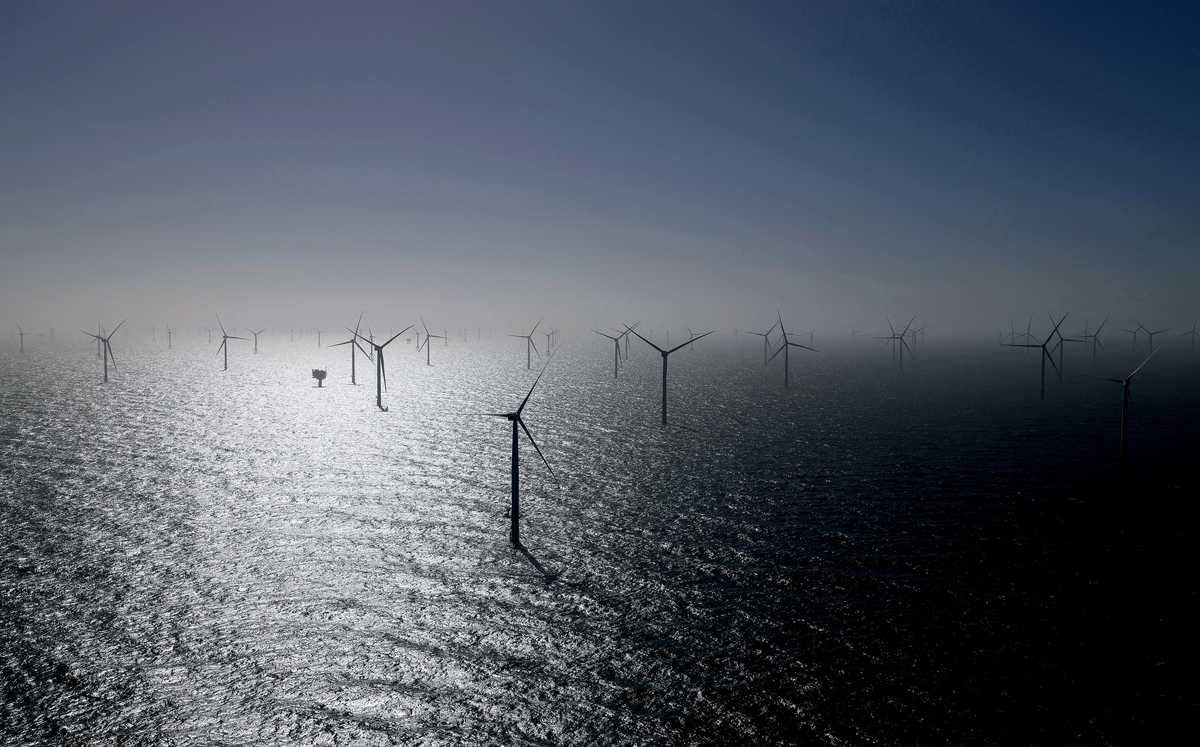
Wind turbines, including some from RWE’s new Kaskasi offshore wind farm, are pictured during the opening of the RWE-Offshore-Windpark Kaskasi, north of Helgoland, Germany, in March 2023.
11:50 JST, December 25, 2024
TOKYO (Reuters) — Japan’s industry and land ministries on Tuesday selected two consortiums, one including energy major BP, as operators for two offshore wind blocks in a third major round of public auctions.
The results of this round held under a law promoting wind power development, were closely watched by domestic and international energy companies weighing the advantages of renewable exposure, industry analysts said.
Japan aims to accelerate offshore wind development as part of its decarbonisation strategy, targeting 10 gigawatts (GW) of offshore wind farm deals by 2030, and up to 45 GW by 2040.
A consortium of JERA, Green Power Investment, and Tohoku Electric Power won the 615 megawatts (MW) wind farm on the southern side of the Japan Sea off Aomori Prefecture, near the city of Tsugaru and the town of Ajigasawa.
Another consortium, including Marubeni, Kansai Electric Power, BP’s unit BP IOTA, Tokyo Gas and local firm Marutaka secured the 450 MW wind farm off the coast of Yamagata prefecture near the Yuza town.
Both bottom-fixed projects are scheduled to begin operations in June 2030, with turbines supplied by Spain’s Siemens Gamesa, a government statement said.
In a previous auction round, Spanish utility Iberdrola and Germany’s RWE were among the winning consortiums of a separate offshore block.
Earlier this month, BP and JERA agreed to join forces to form one of the world’s largest offshore wind operators, highlighting a trend of Japanese firms partnering with western players for expertise and growth, while foreign companies seek entry into Japan’s expanding renewable energy market.
Japan’s government conducted its third round of offshore wind tenders from mid-January to mid-July, as it strives to meet its 2050 carbon-neutral target.
A draft revised energy plan envisions renewables accounting for up to 50% of its electricity mix by fiscal 2040.
However, surging development costs, supply chain issues and inflation have weighed on the offshore wind sector.
Top Articles in News Services
-

Survey Shows False Election Info Perceived as True
-

Hong Kong Ex-Publisher Jimmy Lai’s Sentence Raises International Outcry as China Defends It
-

Japan’s Nikkei Stock Average Touches 58,000 as Yen, Jgbs Rally on Election Fallout (UPDATE 1)
-

Japan’s Nikkei Stock Average Falls as US-Iran Tensions Unsettle Investors (UPDATE 1)
-

Trump Names Former Federal Reserve Governor Warsh as the Next Fed Chair, Replacing Powell
JN ACCESS RANKING
-

Producer Behind Pop Group XG Arrested for Cocaine Possession
-

Japan PM Takaichi’s Cabinet Resigns en Masse
-

Man Infected with Measles Reportedly Dined at Restaurant in Tokyo Station
-

Israeli Ambassador to Japan Speaks about Japan’s Role in the Reconstruction of Gaza
-

Videos Plagiarized, Reposted with False Subtitles Claiming ‘Ryukyu Belongs to China’; Anti-China False Information Also Posted in Japan























